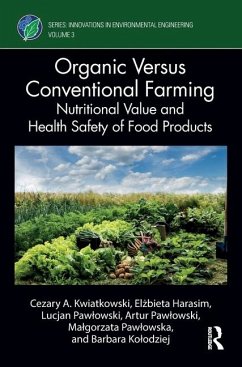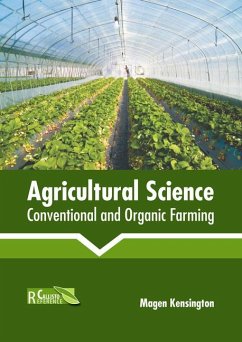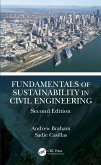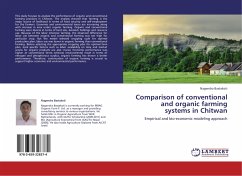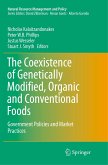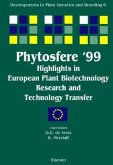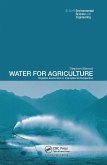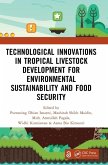Cezary A Kwiatkowski, El Harasim &, Lucjan Pawlowski, Artur Pawlowski, Malgorzata Pawlowska, Barbara Kolodziej
Organic Versus Conventional Farming
Nutritional Value and Health Safety of Food Products
Cezary A Kwiatkowski, El Harasim &, Lucjan Pawlowski, Artur Pawlowski, Malgorzata Pawlowska, Barbara Kolodziej
Organic Versus Conventional Farming
Nutritional Value and Health Safety of Food Products
- Gebundenes Buch
- Merkliste
- Auf die Merkliste
- Bewerten Bewerten
- Teilen
- Produkt teilen
- Produkterinnerung
- Produkterinnerung
Organic Versus Conventional Farming presents the results of a comparison of the quality of food products and raw materials, such as vegetables, fruits and honey, produced in organic and conventional farming systems.
Andere Kunden interessierten sich auch für
![Agricultural Science: Conventional and Organic Farming Agricultural Science: Conventional and Organic Farming]() Agricultural Science: Conventional and Organic Farming156,99 €
Agricultural Science: Conventional and Organic Farming156,99 €![Fundamentals of Sustainability in Civil Engineering Fundamentals of Sustainability in Civil Engineering]() Andrew BrahamFundamentals of Sustainability in Civil Engineering153,99 €
Andrew BrahamFundamentals of Sustainability in Civil Engineering153,99 €![Comparison of conventional and organic farming systems in Chitwan Comparison of conventional and organic farming systems in Chitwan]() Nagendra BastakotiComparison of conventional and organic farming systems in Chitwan33,99 €
Nagendra BastakotiComparison of conventional and organic farming systems in Chitwan33,99 €![The Coexistence of Genetically Modified, Organic and Conventional Foods The Coexistence of Genetically Modified, Organic and Conventional Foods]() The Coexistence of Genetically Modified, Organic and Conventional Foods77,99 €
The Coexistence of Genetically Modified, Organic and Conventional Foods77,99 €![Phytosfere'99 - Highlights in European Plant Biotechnology Research and Technology Transfer Phytosfere'99 - Highlights in European Plant Biotechnology Research and Technology Transfer]() G.E. de Vries / K. Metzlaff (eds.)Phytosfere'99 - Highlights in European Plant Biotechnology Research and Technology Transfer261,99 €
G.E. de Vries / K. Metzlaff (eds.)Phytosfere'99 - Highlights in European Plant Biotechnology Research and Technology Transfer261,99 €![Water for Agriculture Water for Agriculture]() Stephen MerrettWater for Agriculture376,99 €
Stephen MerrettWater for Agriculture376,99 €![Technological Innovations in Tropical Livestock Development for Environmental Sustainability and Food Security Technological Innovations in Tropical Livestock Development for Environmental Sustainability and Food Security]() Technological Innovations in Tropical Livestock Development for Environmental Sustainability and Food Security174,99 €
Technological Innovations in Tropical Livestock Development for Environmental Sustainability and Food Security174,99 €-
-
-
Organic Versus Conventional Farming presents the results of a comparison of the quality of food products and raw materials, such as vegetables, fruits and honey, produced in organic and conventional farming systems.
Hinweis: Dieser Artikel kann nur an eine deutsche Lieferadresse ausgeliefert werden.
Hinweis: Dieser Artikel kann nur an eine deutsche Lieferadresse ausgeliefert werden.
Produktdetails
- Produktdetails
- Verlag: CRC Press
- Seitenzahl: 104
- Erscheinungstermin: 12. Dezember 2023
- Englisch
- Abmessung: 244mm x 170mm x 8mm
- Gewicht: 390g
- ISBN-13: 9781032462516
- ISBN-10: 1032462515
- Artikelnr.: 69948370
- Herstellerkennzeichnung
- Libri GmbH
- Europaallee 1
- 36244 Bad Hersfeld
- gpsr@libri.de
- Verlag: CRC Press
- Seitenzahl: 104
- Erscheinungstermin: 12. Dezember 2023
- Englisch
- Abmessung: 244mm x 170mm x 8mm
- Gewicht: 390g
- ISBN-13: 9781032462516
- ISBN-10: 1032462515
- Artikelnr.: 69948370
- Herstellerkennzeichnung
- Libri GmbH
- Europaallee 1
- 36244 Bad Hersfeld
- gpsr@libri.de
Cezary Andrzej Kwiatkowski, Professor, Ph.D., Sc. D. is a researcher and lecturer working at the Faculty of Agrobioengineering of the University of Life Sciences in Lublin. In 2018, he was awarded the title of professor of agricultural sciences. The research interests of prof. Cezary A. Kwiatkowski, mainly include the following issues: optimization of agronomic practices, agricultural systems, improving agrotechnics of herbal plants and vegetables, the effect of biostimulators and other foliar sprays on crop yield and quality, evaluation of the suitability of spent mushroom substrate (SMS) for crop fertilization, aspects of organic farming in agroecosystems, agrotechnical factors influencing soil quality, the role of agriculture in climate change mitigation and multifunctionality of rural areas. A measurable result of his research is the authorship or co-authorship of 235 papers, including 145 articles in scientific journals, 11 monographs, 24 chapters in monographs and 17 popular science articles, as well as 2 publications related to agricultural practice. The other publications are conference reports. Prof. Cezary A. Kwiatkowski participated in the implementation of 17 research projects, including the manager of 6 scientific grants (2 international) concerning mainly: improvement of agrotechnics of cereal, root and herbal plants, ecological and conventional farming system and sustainable management of mineral and organic fertilizers. Since 2011, he has been the head of the Department of Agritourism and Rural Development operating within the Department of Herbology and Plant Cultivation Techniques. El¿bieta Harasim, PhD., Sc. D. University Professor is a researcher and lecturer at the Department of Herbology and Plant Cultivation Techniques at the University of Life Sciences in Lublin. The main research problems of prof. El¿bieta Harasim include, among others: improving agrotechnics of cereal, herbal and vegetable plants, the impact of the cultivation system (ecological, conventional) on biodiversity, quality of soil and agricultural crops, the effect of biostimulants and foliar fertilizers on crop yield and its quality, the use of alternative sources of fertilization (biochar, zeolite, digestate, fertilizer whey, mushroom substrate) in plant cultivation, methods of weed control, profitability and economic efficiency in plant production, as well as the role of agriculture in mitigating climate change and multifunctionality of rural areas. Her achievements include over 100 scientific and review publications in peer-reviewed international and national journals as well as 7 monographs and 7 chapters in monographs in renowned book publishers and conference reports. Prof. El¿bieta Harasim participated in the implementation of 7 research projects, including two international and national agri-environmental programs. She is a member of the Polish Society of Agronomy. Lucjan Paw¿owski, Ph.D., Sc. D., professor of Lublin University of Technology, Poland, Member of the Polish Academy of Sciences and Member of the European Academy of Sciences and Arts. He was born in Poland, 1946. He studied chemistry at the Maria Curie-Sk¿odowska University. He received his Ph.D. in 1976, and D.Sc. (habilitation) in 1980 both at the Wroc¿aw University of Technology. In 1986 the President of Poland nominated L. Paw¿owski as a full professor. He started research on application of ion exchange for water and wastewater treatment. As a result, together with B. Bolto from CSIRO Australia, he has published book "Wastewater Treatment by Ion Exchange" in which they summarised their own results and experience of ion exchange area. In 1980 L. Paw¿owski was elected President of International Committee "Chemistry for Protection Environment". He was the Chairman of the Environmental Chemistry Division of the Polish Chemical Society in 1980-1984. In 1994 he was elected the Deputy President of the Polish Chemical Society and in the same year, the Deputy President of the Presidium Polish Academy of Science Committee "Men and Biosphere". In 1999, he was elected as a President of the Committee "Environmental Engineering" of Polish Academy of Science. He is member of editorial board of international journals: "Reactive Polymers", "The Science of the Total Environmental", "Environment International", and "Journal of Ecological Chemistry". In 1991 he was elected as the Deputy Rector of the Lublin University of Technology, and he held this post for two terms (1991-1996). He has published 19 books, over 128 papers, and authored 68 patents. Artur Paw¿owski Ph.D., Sc. D., researcher and lecturer at the Faculty of Environmental Engineering of Lublin University of Technology, Poland. He received his M.Sc. in the philosophy of nature and protection of the environment at the Catholic University of Lublin in 1993. In 1993 he received Ph.D. and in 2009 obtained postdoctoral degree, both at The Cardinal Stefan Wyszynski University in Warsaw, Poland. In 2017, he was awarded the title of professor of technical sciences. He is the Head of the Sustainable Development Unit in Institute of Renewable Sources of Energy Engineering at the Lublin University of Technology. The scientific interests of prof. Artur Paw¿owski focus mainly on multidimensional nature of sustainable development, factors connected with climate change, and energy sector, especially in the context of renewable sources of energy. He is Editor-in-chief of the journal Problemy Ekorozwoju/ Problems of Sustainable Development. He authorer or co-authorer more than 200 scientific papers. He is the author of the book "Sustainable Development as a Civilizational Revolution. A Multidisciplinary Approach to the Challenges of the 21st Century (2011) and co-author of the book Biomass for Biofuels (2016). Prof. Artur Paw¿owski is a teacher of the international network called The Baltic University, Sweden. He is also a member of the European Academy of Science and Arts in Salzburg, Austria, member of Research Committee Environment, Climate and Energy of the European Academy of Science and Arts, and member of International Association for Environmental Philosophy, Philadelphia, USA. Malgorzata Paw¿owska Ph.D., Sc.D. researcher and lecturer at the Faculty of Environmental Engineering of Lublin University of Technology. She received her M.Sc. in the philosophy of nature and the protection of the environment at the Catholic University of Lublin in 1993. In 1999, she received Ph.D. in agrophysics at the Institute of Agrophysics of the Polish Academy of Sciences, and in 2010 she obtained a postdoctoral degree in the technical sciences in the field of environmental engineering at the Wroc¿aw University of Technology. In 2018, she was awarded the title of professor of technical sciences. The scientific interests of prof. Mägorzata Paw¿owska focus mainly on the issues related to the reduction the greenhouse gases concentrations in the atmosphere, energy recovery of organic waste, and the possibility of using the waste from the energy sector in the reclamation of degraded land. The measurable outcomes of her research include the authorship or co-authorship of 105 papers, including 40 articles in scientific journals, 4 monographs, 24 chapters in monographs, co-editor of 5 monographs, co-authorship of 15 patents and dozens of patent applications. Prof. Mägorzata Paw¿owska has participated in the implementation of 9 research projects concerning, primarily, the prevention of pollutant emissions from landfills and the implementation of sustainable waste management. In the years 2013-2019 she was the head of the Department of Alternative Fuels Engineering at the Institute of Renewable Energy Sources Engineering. Currently, she heads the Department of Biomass and Waste Conversion into Biofuels. Barbara Ko¿odziej, PhD., Sc. D. is working as a professor and head of Department of Industrial and Medicinal Plants and Laboratory of Quality Assessment of Herbal Raw Materials at University of Life Sciences in Lublin, Poland. Currently, she is Dean of the Faculty of Agrobioengineering at University of Life Sciences in Lublin. She has more than 33 years of teaching and research experience in the fields of biological and agrotechnical aspects of herb and industrial plant production, phytochemistry and bioactive studies. She has been involved in acclimatization of American ginseng in Poland and introduction to the field cultivation of some species that have been extracted from the wild (including protected ones). An important focus of her research is also on the issues related to the phytochemistry of spices and medicinal plants and the introduction of technologies for the management of municipal wastewater through the cultivation of energy crops. Professor Barbara Ko¿odziej has participated in the implementation of several research projects. Moreover, she has published more than 200 research and review publications in peer- reviewed international and national journals and several books, several dozen of monographs and chapters in monographs in reputed book publishers. She is a member of the Polish Herbal Committee and the Polish Agronomic Society.
Preface
Author biographies
1. Agriculture and sustainable development
2. Farming system
3. Chemisation of agriculture in relation to healthy and safe food
4. Food production and processing
5. Quality of selected raw materials and food products derived from organic
and conventional farms - results of own studies and literature review
6. Quality of honey and other bee products derived from conventional and
organic beekeeping farms
Conclusions
References
Author biographies
1. Agriculture and sustainable development
2. Farming system
3. Chemisation of agriculture in relation to healthy and safe food
4. Food production and processing
5. Quality of selected raw materials and food products derived from organic
and conventional farms - results of own studies and literature review
6. Quality of honey and other bee products derived from conventional and
organic beekeeping farms
Conclusions
References
Preface
Author biographies
1. Agriculture and sustainable development
2. Farming system
3. Chemisation of agriculture in relation to healthy and safe food
4. Food production and processing
5. Quality of selected raw materials and food products derived from organic
and conventional farms - results of own studies and literature review
6. Quality of honey and other bee products derived from conventional and
organic beekeeping farms
Conclusions
References
Author biographies
1. Agriculture and sustainable development
2. Farming system
3. Chemisation of agriculture in relation to healthy and safe food
4. Food production and processing
5. Quality of selected raw materials and food products derived from organic
and conventional farms - results of own studies and literature review
6. Quality of honey and other bee products derived from conventional and
organic beekeeping farms
Conclusions
References

